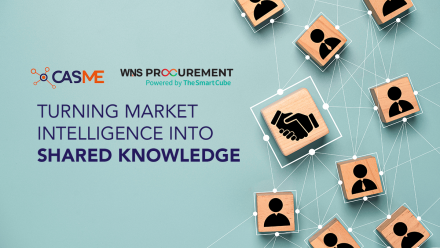
Conversations with CASME members have highlighted that the thirty-year high inflation being experienced across many parts of the world has become the key hot topic, and a significant challenge for all procurement teams.
An ensuing SnapShot survey has revealed the mitigating actions being taken by the CASME procurement community, especially when negotiating with suppliers that attempt to increase prices due to rising inflation. Read on to compare whether your actions are similar, and to gain hints and tips from the various SnapShot results. You can also listen in full to the recent webinar where our panel of procurement experts discussed strategies for dealing with inflationary pressures.
Mitigating actions associated with strategy:
- Applying demand/consumption management to optimise or reduce usage
- Increasing volumes
- Negotiating volume discounts, or volume rebates based on future thresholds
- Bundling or unbundling as appropriate
- Forward buying/hedging, if permitted
- Bringing forward deliveries to mitigate delays
- Booking longer supply periods to provide certainty and backwards negotiation
- Securing the material may be more important than price
- Expanding the scope of work to leverage economies of scale and secure cheaper unit pricing
- Moving freight by sea rather than by air
- Moving services from Russia to other countries
Mitigating actions associated with contracts:
- Maintaining already implemented long-term contracts when possible
- Extending existing agreements when favourable
- Increasing the length of the contract
- Negotiating long-term contracts with trigger pricing and cost drivers
- Applying shorter-term agreements/adjustments
- Shortening the period for price validity/agreement to address volatile and unsecure markets
- Negotiating with suppliers on current contracts with the aim of sharing any price increases
- Determining if additional scope/services can be included in the agreement
- Agreeing rise and fall mechanisms in supply contracts
- Maximum capped end rates
- Including clauses regarding inflation
- Competitive bidding
- Open book costing
- Fixed price contracts
- Determining margin breakdowns
- Basing negotiations on data and facts
Mitigating actions associated with suppliers:
- Leveraging long term, ongoing partnerships
- Leveraging EMEA contacts with main suppliers when negotiating individual country contracts
- Supplier partnership approach; aiming to establish a long-term mutual relationship
- Nurturing the relationship
- Seeking win-win negotiations
- Using instances of poor performance to challenge price increases during negotiations
- Researching alternative sources of supply
Mitigating actions associated with cost:
- Using data to challenge the cost increase (Office of National Statistics data)
- Assessing the competitiveness of the current rates against the market options
- Gaining a better understanding of the price structure
- Evaluating the real impact of commodity prices (e.g. fuel, electricity, gas) in the supplier's cost structure
- Identifying category-specific inflationary factors that apply to the rates being negotiated rather than using a generic CPI index
- Analysing the rate history to identify when it was last adjusted and how any increases are tracked
- Deferring price increases until contract expiration
- Postponing price adjustments to avoid the need to consider current peaks
- Focusing on price trends rather than price spikes
- Negotiating cost avoidance, for example by negotiating an increase that is less than the rate of inflation
- Reducing prices through should-cost modelling
- Using average costs rather than spot rates
- Averaging prices over a longer term
- Conducting a currency check to determine whether it is more advantageous to pay in US dollars, Euros or other currency.
For further information on how CASME members benefit from benchmarking studies such as these, read all about our Benchmarking Services or contact us.
Back to News



